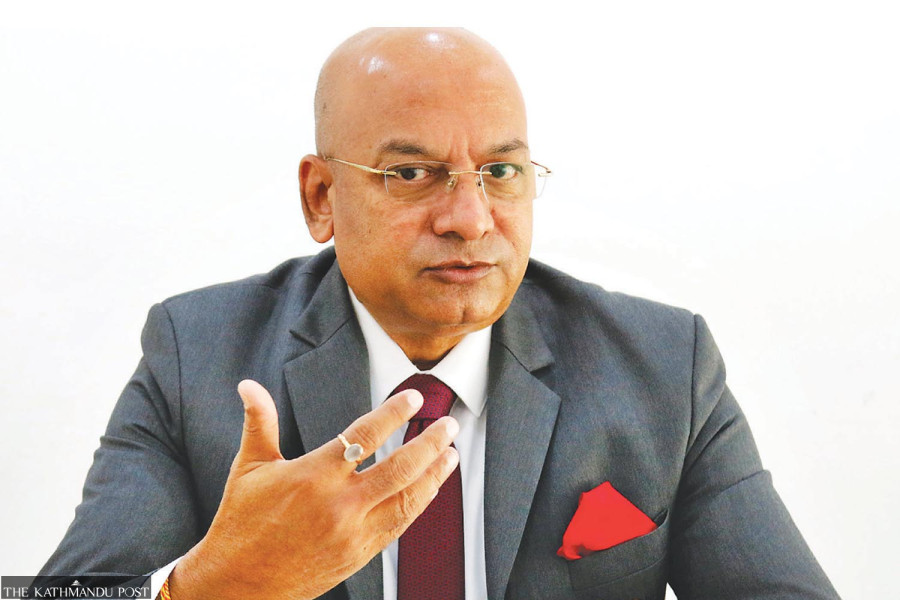Money
‘We are looking to expand our EVs market to Nepal’
Omega Seiki Mobility has launched battery-powered transport vehicles in Nepal.
Post Report
Omega Seiki Mobility, an Indian electric vehicles (EVs) manufacturer, has launched its battery-operated commercial goods vehicles in Nepal. Morang Auto Works is the dealer of the company’s vehicles. The company plans to set up charging stations in different locations and provide training to technicians with regard to the repair and maintenance of their vehicles in Nepal. In an interview with the Post, Deb Mukherji, managing director of Omega Seiki talked about the electric goods carrier market and his company’s plans to open a manufacturing unit in Nepal. Here are the excerpts:
Tell us about your company and its market expansion plans in Nepal. What was the market response?
Omega Seiki Mobility is the leading manufacturer of EVs in India. We commercially launched our three-wheeler ‘Rage +’ in 2020, which we have currently brought to Nepal. We have four manufacturing units in India. We have also launched electric two-wheeler scooters and we will be launching pickup trucks soon. We partnered with Morang Auto Works (MAW) in Nepal to sell our vehicles in Nepal about six months ago. We have introduced a three-wheeler in Nepal’s market for cargo and passenger transportation. We are looking to expand in this market segment. We are receiving a very good response for our vehicles in the Nepali market. We are very happy to be one of the first early movers in this market. Nepal is an energy-surplus country and there is a future of EVs here. The vehicles we produce are cost-effective. The running cost of our EVs comes to about one-tenth, as compared to diesel-consuming vehicles. So, the customers will definitely like our vehicle that is truly value for money.
What is the demand for EV goods carriers in Nepal?
I think fossil fuel vehicles would soon shift to electric in Nepal as they provide benefits to the end user. So, I think there will be a very big demand for cargo vehicles. Currently, we have a three-wheeler under the L5 category, which can carry a load of around 700 kilos and go up to 130 km on a single charge. We are also bringing e-rickshaws for passenger carriers.
Since Nepal does not have a sufficient number of public charging points, how does the company help to provide its services in the country?
This is a very important part of the whole EVs business. There are two options for our vehicles, one is that it can be charged at home, which takes around 4 hours to be charged fully. For the commercial mode of transport, we will set up charging stations throughout the Kathmandu Valley in the initial phase and then in other parts of the country. Establishing charging stations is also a part of our agreement with MAW. Initially, we plan to set up 30 charging stations in the valley.
Does your company have any plans to open a manufacturing unit in Nepal?
Yes. We would like to do that because we want Nepal not just to use our vehicles, but produce them too. And, we have done the same thing in Bangladesh. We have a collaboration in Egypt as well, where our vehicles are running and we are opening a manufacturing unit there. That’s the strategy of Omega Seiki Mobility. We would start with the assembly plant first and then gradually, will start manufacturing the vehicle in Nepal.
What are the new products the company plans to launch?
We have a full range of products, like the e-rickshaw. We will launch pickup trucks, which have a capacity to carry 1 ton of load. We will also introduce electric scooters.
What are the reasons behind targeting the Nepal market?
It is mainly due to the availability of electricity. We also see market opportunities here to build an electric vehicle ecosystem. In Nepal, a lot of foreign exchange goes out of the country for purchasing fossil fuels. Also, Nepal has a young population and this is where we can make a difference.




 9.83°C Kathmandu
9.83°C Kathmandu














